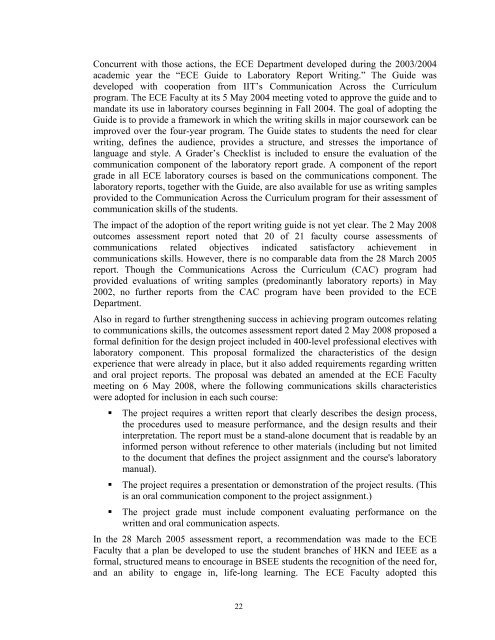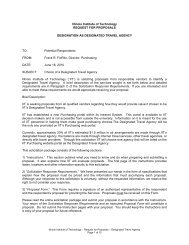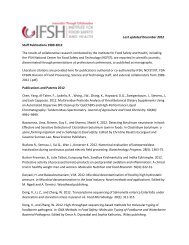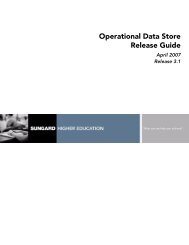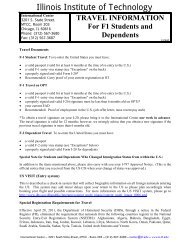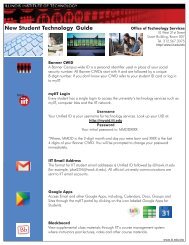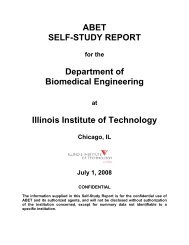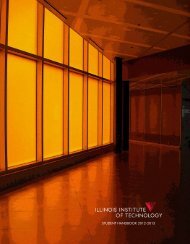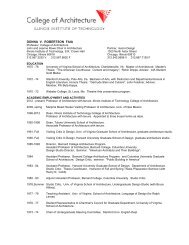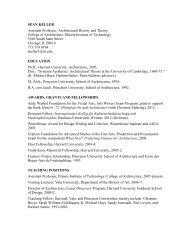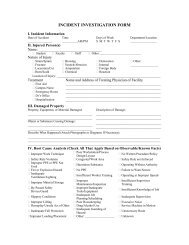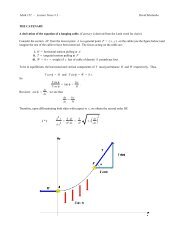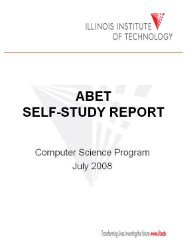IIT BSCPE Self Study 2008 - Illinois Institute of Technology
IIT BSCPE Self Study 2008 - Illinois Institute of Technology
IIT BSCPE Self Study 2008 - Illinois Institute of Technology
You also want an ePaper? Increase the reach of your titles
YUMPU automatically turns print PDFs into web optimized ePapers that Google loves.
Concurrent with those actions, the ECE Department developed during the 2003/2004<br />
academic year the “ECE Guide to Laboratory Report Writing.” The Guide was<br />
developed with cooperation from <strong>IIT</strong>’s Communication Across the Curriculum<br />
program. The ECE Faculty at its 5 May 2004 meeting voted to approve the guide and to<br />
mandate its use in laboratory courses beginning in Fall 2004. The goal <strong>of</strong> adopting the<br />
Guide is to provide a framework in which the writing skills in major coursework can be<br />
improved over the four-year program. The Guide states to students the need for clear<br />
writing, defines the audience, provides a structure, and stresses the importance <strong>of</strong><br />
language and style. A Grader’s Checklist is included to ensure the evaluation <strong>of</strong> the<br />
communication component <strong>of</strong> the laboratory report grade. A component <strong>of</strong> the report<br />
grade in all ECE laboratory courses is based on the communications component. The<br />
laboratory reports, together with the Guide, are also available for use as writing samples<br />
provided to the Communication Across the Curriculum program for their assessment <strong>of</strong><br />
communication skills <strong>of</strong> the students.<br />
The impact <strong>of</strong> the adoption <strong>of</strong> the report writing guide is not yet clear. The 2 May <strong>2008</strong><br />
outcomes assessment report noted that 20 <strong>of</strong> 21 faculty course assessments <strong>of</strong><br />
communications related objectives indicated satisfactory achievement in<br />
communications skills. However, there is no comparable data from the 28 March 2005<br />
report. Though the Communications Across the Curriculum (CAC) program had<br />
provided evaluations <strong>of</strong> writing samples (predominantly laboratory reports) in May<br />
2002, no further reports from the CAC program have been provided to the ECE<br />
Department.<br />
Also in regard to further strengthening success in achieving program outcomes relating<br />
to communications skills, the outcomes assessment report dated 2 May <strong>2008</strong> proposed a<br />
formal definition for the design project included in 400-level pr<strong>of</strong>essional electives with<br />
laboratory component. This proposal formalized the characteristics <strong>of</strong> the design<br />
experience that were already in place, but it also added requirements regarding written<br />
and oral project reports. The proposal was debated an amended at the ECE Faculty<br />
meeting on 6 May <strong>2008</strong>, where the following communications skills characteristics<br />
were adopted for inclusion in each such course:<br />
• The project requires a written report that clearly describes the design process,<br />
the procedures used to measure performance, and the design results and their<br />
interpretation. The report must be a stand-alone document that is readable by an<br />
informed person without reference to other materials (including but not limited<br />
to the document that defines the project assignment and the course's laboratory<br />
manual).<br />
• The project requires a presentation or demonstration <strong>of</strong> the project results. (This<br />
is an oral communication component to the project assignment.)<br />
• The project grade must include component evaluating performance on the<br />
written and oral communication aspects.<br />
In the 28 March 2005 assessment report, a recommendation was made to the ECE<br />
Faculty that a plan be developed to use the student branches <strong>of</strong> HKN and IEEE as a<br />
formal, structured means to encourage in BSEE students the recognition <strong>of</strong> the need for,<br />
and an ability to engage in, life-long learning. The ECE Faculty adopted this<br />
22


